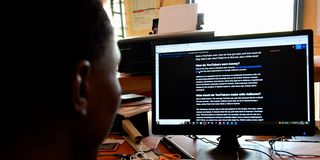Call for gender data to bridge Africa's digital gap

A section of African leaders is rooting for a continental campaign aimed at having better gender data to quantify and bridge the digital divide.
What you need to know:
- The leaders, drawn from governments, the private sector and civil society, for example, stressed the need to capture and analyse sex-disaggregated data on ICT access, skills, and leadership.
- They unanimously agreed on the importance of gender data to help bridge the digital gender gap, during a virtual meeting held under the theme Bridging the Gender Divide for DigitALL Equality in Africa.
A section of African leaders is rooting for a continental campaign aimed at having better gender data to quantify and bridge the digital divide.
The leaders, drawn from governments, the private sector and civil society, for example, stressed the need to capture and analyse sex-disaggregated data on ICT access, skills, and leadership.
They unanimously agreed on the importance of gender data to help bridge the digital gender gap, during a virtual meeting held under the theme Bridging the Gender Divide for DigitALL Equality in Africa.
Nathan Menton, a statistician in the ICT Data and Analytics Division at the International Telecommunication Union (ITU), said statistics show that women in Africa are half as likely to use the Internet as women in the rest of the world and about 25 per cent less likely to own mobile phones. Many women and girls for whom the digital revolution is out of reach are, therefore, at serious risk of being left behind, potentially deepening existing socioeconomic and gender inequalities.
Innovation
Digital innovation is rapidly changing how people live and work, but inequity in access persists. A recent survey conducted in Europe estimated that 90 per cent of jobs in the region will soon require skills in ICT. Albert Motivans, head of Data and Insights for Equal Measures 2030, noted that while the difference between women’s and men’s access to and use of ICT is shrinking in some parts of the world, in Africa, available data shows the gender digital divide is growing.
Participants opined that while digital technology has the potential to raise incomes and improve the quality of life for countless people, so far, it has mainly benefitted those who can afford and access these tools. They appealed to African governments to have a clear roadmap for breaking barriers to access.
“The link between technology and women’s rights is clearly reflected in the Sustainable Development Goals. Goal Five on gender equality and women’s empowerment includes a specific target on utilising technology and ICT to empower women and girls,” said Zebib Kavuma, the deputy regional director for UN Women East and Southern Africa.
The Covid-19 pandemic has shown that access to technology is no longer a luxury but a necessity. However, despite this realisation, digital adoption remains lower for girls, and they often do not benefit from this technology in the same way as boys.
Empowerment drives
For this reason, UN Women, African Union Commission and ITU have come up with innovative programmes such as African Girls Can Code Initiative (AGCCI) to empower girls through digital and computer literacy, placing them on the path to tech careers.
“The Africa we want is a non-sexist Africa where both girls and boys can reach their full potential and women and men can contribute equally to the development of their societies. This is an integral part of the African Union’s vision for full gender equality in all spheres of life,” said Leila Ben Ali, the head of Statistics at the African Union Commission.
“Since ICTs advance gender equality and empower women in many ways, the push to encourage more African women and girls to pursue studies and careers in Stem is imperative for their social and economic empowerment, and, indeed, for the region,” said Christine Sund, the senior advisor for ITU’s Regional Office for Africa.
Marc Koffi Kouakou, the principal gender statistician, economist and Africa Gender Index (AGI) task manager for the African Development Bank, said official sex-disaggregated data on ICT access, skills, and leadership is essential.
“Beyond accurately quantifying the digital gender gap, gender data is crucial for countries to develop appropriate ICT policies and plans, allocate the necessary resources including for training, and effectively track and scale up the impact of these interventions,” said Papa Seck, Chief of Research and Data for UN.
According to the ITU, about 90 per cent of jobs worldwide have a digital aspect, hence the need to involve women fully in the digital space. Data from the organisation shows that in 2022, 62 per cent of men were using the Internet compared to 57 per cent of women, meaning the global internet use gender gap stands at eight per cent.
However, this divide is more glaring in the least developed countries, many of which are in Africa, where only 19 per cent of women used the Internet in 2020, compared to 86 per cent in the developed world.
ITU notes digital technology has been touted as the basis for jobs of the future, which will be a big part of drivers of the economy, thus having fewer women in this space will be locking a huge part of the population out of jobs.





